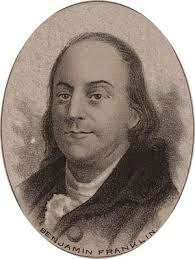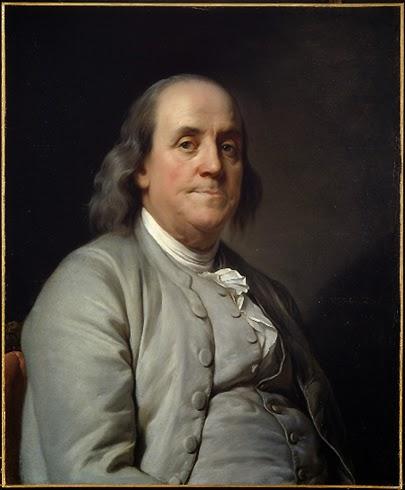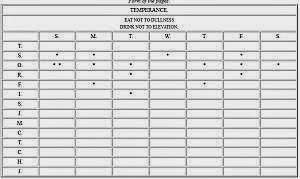 It is an age-old question. If you ask someone, "Do you think you will go to heaven when you die?" Most often they will reply, "I think so. I've been a good person."
It is an age-old question. If you ask someone, "Do you think you will go to heaven when you die?" Most often they will reply, "I think so. I've been a good person."The question arising after that is "What is good?" Even then, most people will answer with a list of attributes that include do's and don'ts. They'll say that they would be qualified for heaven because they don't steal, they don't murder, they don't cheat. They'll say that they are nice, kind, charitable, loving, and so on.
But let's back up to a moment even just before the person's answer about being good. Why is there a universal acknowledgement in the first place that one must be good to get to heaven? Why can't we just go there after we die? Why is that even in the mix at all?
Because God in us put the desire to be good. Most people acknowledge that we need to be 'good.' But where false religions come in is their acknowledgement of their definitions of good, and from whence the qualifying benchmarks come. Christians know that the external source of all Good is God, (Matthew 19:17) and the benchmark for attaining heaven is written in the bible. Yet non-Christians still feel the pull of conscience, conviction of sin, and therefore they intrinsically understand there is a bad, or evil. They express the intuitive understanding that we cannot go to heaven as we are. We must be 'good.'

For ages, people have tried to go their own way with being good, attaining a morality of their own making that would be pleasing (to whomever, to their own self, to society, or to a made-up false god, etc. Let's take a case-study of this attitude in a famous American: Benjamin Franklin.
They show that the work of the law is written on their hearts, while their conscience also bears witness, and their conflicting thoughts accuse or even excuse them. (Romans 2:15)
Franklin is a good one to study because he was obsessed with self-improvement, he acknowledged a deity, he proclaimed a need for a moral code, and he was a prolific writer.
It should be said at the outset, that Benjamin Franklin was not saved. He was not a Christian. As a matter of fact, from the beginning of his life to the end, though he acknowledged the likelihood of the existence of 'a deity', he repudiated the personal need for one.
In fact, Franklin wrote in 1757 of his pity for-
"weak and ignorant men and women, and of inexperienced, inconsiderate youth of both sexes, who have need of the motives of religion to restrain them from vice, to support their virtue, and retain them in the practice of it till it becomes habitual..."
So we need that though Franklin knew that man needed to be good, he denied needing any help in attaining it. He would do it himself. To wit, exhibit A.
In his autobiography, a young Franklin wrote,
It was about this time I conceived the bold and arduous project of arriving at moral perfection. I wished to live without committing any fault at any time; I would conquer all that either natural inclination, custom, or company might lead me into. As I knew, or thought I knew, what was right and wrong, I did not see why I might not always do the one and avoid the other.Pride is at the root of all sins, it is the first sin, it is the universal sin. Here we see the result of Franklin's unsancitifed mind: he would conquer all his faults and become perfect.
Then he wrote,
But I soon found I had undertaken a task of more difficulty than I had imagined.I'm shocked. Shocked.
While my care was employed in guarding against one fault, I was often surprised by another; habit took the advantage of inattention; inclination was sometimes too strong for reason. I concluded, at length, that the mere speculative conviction that it was our interest to be completely virtuous was not sufficient to prevent our slipping, and that the contrary habits must be broken, and good ones acquired and established, before we can have any dependence on a steady, uniform rectitude of conduct. For this purpose I therefore contrived the following method.Franklin was surprised by how often different "faults," as he put them, popped up in his daily life. What he needed was to be organized. Then he'd be on his way to moral perfection.
 What Franklin did was create a little booklet containing lines and columns, like a ledger. He'd mark one spot for his failures for each day of the week and one line for each of his virtues he was trying to perfect. Though there hundreds of virtues a person can display, selected 12 in particular Franklin thought he needed improvement on. He added the 13th, 'Humility" because a Quaker friend said that Franklin was well-known to be difficult to converse with because of his tendency to dominate the conversation and telling everyone they were wrong. After the Quaker friend gave Franklin some examples, Franklin decided to add the 13th and work on humility.
What Franklin did was create a little booklet containing lines and columns, like a ledger. He'd mark one spot for his failures for each day of the week and one line for each of his virtues he was trying to perfect. Though there hundreds of virtues a person can display, selected 12 in particular Franklin thought he needed improvement on. He added the 13th, 'Humility" because a Quaker friend said that Franklin was well-known to be difficult to converse with because of his tendency to dominate the conversation and telling everyone they were wrong. After the Quaker friend gave Franklin some examples, Franklin decided to add the 13th and work on humility.Though in the list below, the Christian can see the roots of these virtues in certain portions of scripture, Franklin did not ascribe their source to the bible. How or why he self-selected these thirteen and not another thirteen, is also part of man's delusion that he can become good. One needs perfection in ALL in order to be considered good on the same level that Jesus is Good. Franklin decided that he would 'fix' one at a time, turning an opposing vice into the stated virtue. Incredibly, he estimated that it would take one week to fix each one, and that he could conclude his project in 13 weeks.
Franklin's list of virtues he planned to pursue to perfection,
Temperance
Eat not to dullness; drink not to elevation.
Silence
Speak not but what may benefit others or yourself; avoid trifling conversation.
Order
Let all your things have their places; let each part of your business have its time.
Resolution
Resolve to perform what you ought; perform without fail what you resolve.
Frugality
Make no expense but to do good to others or yourself, i.e., waste nothing.
Industry
Lose no time; be always employed in something useful; cut off all unnecessary actions.
Sincerity.
Use no hurtful deceit; think innocently and justly, and, if you speak, speak accordingly.
Justice
Wrong none by doing injuries or omitting the benefits that are your duty.
Moderation
Avoid extremes; forbear resenting injuries so much as you think they deserve.
Cleanliness
Tolerate no uncleanliness in body, clothes, or habitation.
Tranquillity
Be not disturbed at trifles, or at accidents common or unavoidable.
Chastity
Rarely use venery (sexual intercourse) but for health or offspring, never to dullness, weakness, or the
injury of your own or another's peace or reputation.
Humility
Imitate Jesus and Socrates.
 Did you ever read anything more proud? Anyway, for example, he chose to work on "Cleanliness" but did not include patience. Perhaps he thought he or his floor, could be better scrubbed, but had already achieved moral perfection in displaying patience? Or maybe there as a bit of the old craftiness in his selection, because cleanliness is a quantifiable virtue, an external virtue that others can see, and one that is easier to attain than, say, tranquility (especially when his wife would do most of the cleaning).
Did you ever read anything more proud? Anyway, for example, he chose to work on "Cleanliness" but did not include patience. Perhaps he thought he or his floor, could be better scrubbed, but had already achieved moral perfection in displaying patience? Or maybe there as a bit of the old craftiness in his selection, because cleanliness is a quantifiable virtue, an external virtue that others can see, and one that is easier to attain than, say, tranquility (especially when his wife would do most of the cleaning).In his pride, Franklin surmised that all it would take would be thirteen weeks dedication to the project and then moral perfection would be attained. He did write in the future he planned to write a book on how to attain moral perfection using his method, and all people would be able to benefit from it. To that end, he purposely avoided mention of any one religion saying,
I had purposely avoided them [religious sects]; for, being fully persuaded of the utility and excellency of my method, and that it might be serviceable to people in all religions..." [emphasis mine]
It wasn't long before Franklin understood that the project of attaining moral perfection would take longer than 13 weeks. As a matter of fact, he kept his book, with few intermissions, for 50 years. Of all the virtues, he found humility the hardest to overcome. After a while Franklin simply used less dogmatic and inflammatory language. He'd say, "I perceive" instead of "Undoubtedly," and "I apprehend" instead of "Certainly." The most he could do was fake humility. Side note: if all you're doing is faking humility, doesn't that also destroy 'Sincerity'?

At the end of his life, Franklin wryly wrote that despite his best efforts to disguise his pride with cloaking language that he thought would be less dogmatical,
In reality, there is, perhaps, no one of our natural passions so hard to subdue as pride. Disguise it, struggle with it, beat it down, stifle it, mortify it as much as one pleases, it is still alive, and will every now and then peep out and show itself; you will see it, perhaps, often in this history; for, even if I could conceive that I had completely overcome it, I should probably be proud of my humility.
Preacher Charles Spurgeon said in sermon #2591, "Pride the Destroyer"
This sin of pride is often forgotten and many persons do not even think it is a sin at all. Here is a man who says that he is absolutely perfect. Does he know what the sin of pride really is? What prouder being can there be than one who talks like that? “Oh, but,” he says, “I am humble.” Is there any soul living that is so proud as he is who says he is humble? Is not that the acme and climax of pride?
The older Franklin got, the more he acknowledged that perhaps the Deity was indeed involved in the affairs of men, and perhaps Jesus of Nazareth was a good man delivering the best "system of morals" the world ever saw, but refused to believe in Jesus' divinity. Sorrowfully, at the end of his life, Franklin wrote,
"I have ... some doubts as to his divinity; tho’ it is a question I do not dogmatize upon, having never studied it, and think it needless to busy myself with it now, when I expect soon an opportunity of knowing the truth with less trouble."
Franklin couldn't be troubled to discover his eternal destiny? It was Franklin's eternal mistake.
As for our Lord, isn't a relief we do not have to spend 50 years trying to perfect humility only to fail every time? Isn't is a wonderful thing that we don't have to look at an eternity of pride blotting our heart to the detriment of all our relationships? Because we cannot attain moral perfection. We can't even go a day and not fail to display some grievous display of moral corruption.
Only Jesus is Good, and that (Luke 18:19). This is why only He could be the sacrificial Lamb, slain so He could shed His blood to cover our sins.
For by grace you have been saved through faith. And this is not your own doing; it is the gift of God, (Ephesians 2:8)
We cannot be good without God. But by grace, we have God.

